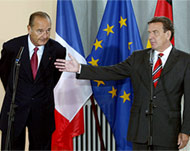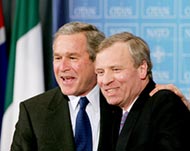US, EU differ on Iran, China
Differences resurfaced over China and Iran even as Nato allies pledged to help train Iraqi security forces after US President Bush sought to mend the transatlantic split over the war on Iraq.

Bush voiced concern on Tuesday at European Union plans to end an arms embargo on Beijing, and France pressed Washington to offer Tehran incentives to curb its nuclear programme.
France and Germany also renewed calls for a reform of transatlantic relations that would give greater weight to the emerging, enlarged EU as the key US partner, challenging the primacy Washington accords to Nato.
Bush told reporters after a summit of the 26 Nato leaders that the Cold War defence alliance remained the central security organisation binding Europe and the United States.
New reality
“I think it is the vital relationship for the United States when it comes to security,” Bush said. “It is a relationship that … has worked in the past and is adjusting so that it works in the future.”
 |
|
Chirac and Schroeder had stoutly |
French President Jacques Chirac said he sensed in talks with Bush on Monday night that the US leader understood what he called the new European reality, in which the EU was taking on ever greater weight, including in defence.
“Europe and the United States are real partners. So we need to dialogue and listen to each other more,” he told the summit.
“We must also, as the German chancellor has underlined, continue to take account of the changes that have occurred on the European continent.”
Nato Secretary-General Jaap de Hoop Scheffer trumpeted the agreement of all 26 allies to make some contribution to the Iraq training mission as a sign of the alliance’s rediscovered unity.
Wide divergence
But that boast masked wide divergence in the level of help on offer. France, the most virulent European critic of the war, agreed for just one of its officers at Nato headquarters to help coordinate offers of equipment to the Iraqi military.
 |
|
Nato chief Jaap de Hoop Scheffer |
Asked if he was satisfied with such token contributions, Bush shrugged: “Every contribution helps.”
The United States is to provide around 60 trainers out of a total close to 160. France, Germany and Belgium remain adamant that their personnel not serve inside Iraq.
Bush later held talks with the 25-member EU on a tightly scripted day meant to highlight common purpose in rebuilding Iraq and Afghanistan and spreading democracy in the Middle East.
He voiced worries that EU plans to end a ban on arms sales to China could change the balance with Taiwan, which Washington is committed to defend, but hinted he could accept EU assurances that it would not lead to dangerous technology transfers.
Bush said European leaders would have to “sell” such assurances to a sceptical US Congress, which has threatened to curtail military-technology sharing with Europe over the issue.